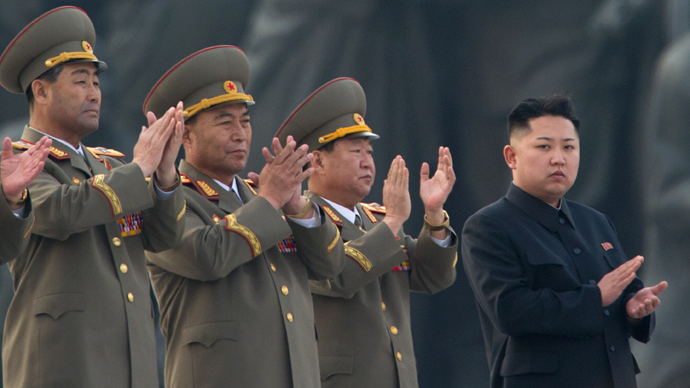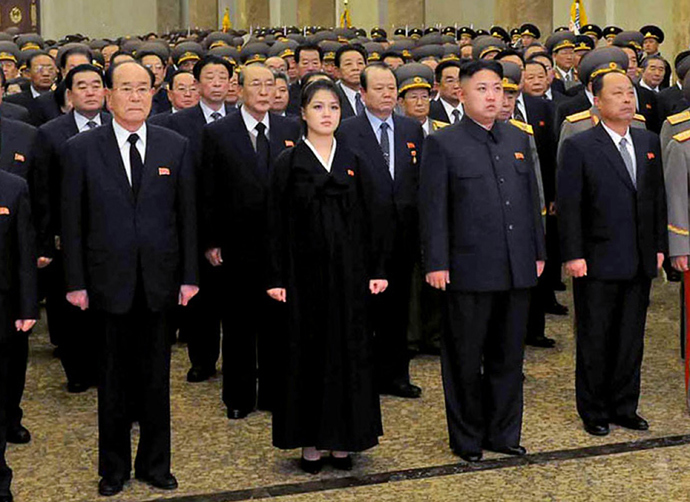Want a comfortable temperature on the Korean Thermostat? - Time to talk!

Despite the bellicose rhetoric emanating from Pyongyang, the situation has subsided. If outside parties are interested in seeing a more rational North Korea, it is worth using every opportunity to engage with it, especially in high-level talks.
North Korea now finds itself under tougher sanctions that target its financial sector, and a neighbor in Beijing that is growing increasingly less patient with the young Kim’s saber rattling.
After recent talks with the South, the first in over two years, were stymied by shrewd diplomatic disagreements and eventually shelved, Pyongyang called for high-level talks with the United States. US officials responded coldly to Pyongyang’s offer and insinuated that they would not abandon their preconditions-for-dialogue approach. Washington spokesmen also told the media that the North could not talk its way out of sanctions, and that Pyongyang would be judged "by its actions and not its words." The preconditions refer to Pyongyang dismantling its nuclear weapons program before any iota of cooperation with the US can take place, something the North has adamantly refused to do.
There are a few key reasons why Pyongyang will almost certainly never dismantle its nuclear program voluntarily. On the domestic front, the attainment of a nuclear deterrent during the heyday of the late Kim Jong-il has been trumpeted as the greatest achievement of the nation, and more importantly, the Dear Leader.
State media, which often weaves militaristic rhetoric with race-based nationalism, has depicted the nuclear program as a guarantee that the Korean race would be forever protected from foreign threats – and with no access to non-state media, the North Korean people understandably endorse that narrative.
Pyongyang has also been taking notes, and they’ve noticed that when countries have nuclear weapons, they are usually not attacked – and even when a country dismantles its nuclear program in exchange for diplomatic engagement with the West, security is never a guarantee. Whether or not we would like to admit it, the fact that the Kim dynasty is in its third generation is proof that their overall strategy has worked, at least to preserve the regime.
‘Actions, not words’
Nobody can deny that the North is an oppressive state – it has violated UN resolutions and overseen institutional human rights abuses – but it is still necessary to attempt seeing things from their perspective.
Washington talks of judging others by actions rather than words, and so, Pyongyang was naturally on the defensive when the US brought in nuclear-capable B2 stealth bombers during war games with the South earlier this year.
Although the rhetoric coming out of Washington was not as bellicose as that of Pyongyang, the US military’s mock nuclear bombing of the North sent a threatening message that would garner a hardline reaction from any country. (Imagine the Cubans flying nuclear-capable bombers off the waters of Florida.)

Several commentators have pointed out how the military exercises held annually by South Korea and the United States have violated international law by provocatively firing live rounds into disputed maritime areas; a strong case can be made that they undermine Pyongyang’s territorial integrity.
If we judge others by actions and not words, these exercises unnecessarily raise antagonisms and are a major obstacle to any diplomatic cooling of the situation.
Not to condone Pyongyang’s belligerence, but the US has conducted more nuclear tests than any other nation, and South Korea launched a satellite using a long-range rocket just seven weeks after the North launched theirs; these countries are not subjected to crippling sanctions and mock invasions.
Pyongyang legitimizes its defiance because it feels that the outside world is backing it into a corner and attempting to legally thwart its capacity to develop and defend itself. As others have pointed out before, the US is unwilling to seriously engage North Korea because it does a better job serving the Pentagon’s interests with all its huffing and puffing.
Is Beijing pivoting away from Pyongyang?
The strategic pivot to Asia taking place under the Obama administration is, no matter how much the US denies it, a move to counter the growing military and economic pre-eminence of China.
As a result, it is in Washington’s interests to maintain a heighted state of tension on the Korean Peninsula, without the situation bubbling over into war, so as to dramatically increase US military presence in the region under the guise of the North Korean threat, while undertaking enormously lucrative weapons contracts with allied countries in the region.
Under the incumbent administration of Chinese President Xi Jinping, Beijing has begun modestly increasing pressure on Pyongyang. Obama and Xi met recently for unofficial talks in California, and word is that both leaders will not accept North Korea as a nuclear-armed state, and have agreed to work together to deepen cooperation and dialogue to achieve de-nuclearization.
This approach is different than that of previous Chinese policy, which vocally opposed Pyongyang’s nuclear adventurism, but took to promoting economic reform as a means of normalizing the regime’s conduct, with little emphasis on consequences.
At past meetings of the biannual Pyongyang International Trade Fair, which brings companies to the North to invest in various projects, more than 70 percent of participants came from China.
In a huge shift in direction, Beijing has barred Chinese companies from attending this year’s fair – though, that doesn’t mean those companies aren’t still doing business there. China still has deep economic interests in the North, which they will not walk away from so easily.

In 2012, Pyongyang leased two small islands to China with the purpose of experimenting with economic reforms. It was expected that Chinese companies would build factories and hire cheap North Korean labour to manufacture various products, and since the Islands are closer to the Chinese side of the Yalu river, whatever reforms take place there will not effect what goes on in the North substantially.
Socialism with Korean characteristics?
The Chinese have been trying to coax Pyongyang into making economic reforms in line with‘Deng Xiaoping thoughts,’ the man who steered the early days of China’s economic reforms and gave rise to what is referred to today as ‘Socialism with Chinese characteristics’.
North Korea hasn’t been entirely receptive to enacting economic reforms, because such a move would engender risk. So far, it has allowed farmers to keep a percentage of their produce for private sale and has allowed street-markets to exist, mirroring the earliest seedlings of reform in post-Mao China.
The two islands leased to the Chinese, Hwanggumpyong and Wihwa, haven’t gotten off the ground, due to the unstable investment climate. The Kaesong Industrial Complex, made up of South Korean owned factories inside North Korean territory that employs North Korean labor to manufacture goods for export, was closed by Pyongyang during the tension earlier this year, causing thousands to lose their jobs and the North taking a major financial hit by sabotaging a valuable source of foreign capital.
Pyongyang is an extremely stubborn actor and is unwilling to make serious reforms, probably because it feels it lacks the political security to do so. So what does the North want? In May, it promised to restart the Kaesong complex if the South ceases all "hostile acts and military provocations," i.e., its annual war-games with the US – Seoul shot back saying that Pyongyang’s demands were “completely incomprehensible and unfair."
And so, the Koreans keep going in diplomatic circles. No major countries would be willing to recognize North Korea as a nuclear-state, but if the outside world wants more leverage on the nuclear issue, attempts to establish greater trust with Pyongyang are a necessity – otherwise, this situation will continue to grow into something unmanageable and more dangerous.
The first step should be re-establishing the North’s joint economic projects with Seoul and Beijing, because a more isolated and desperate Pyongyang is not in the interests of the people in the region.
The statements, views and opinions expressed in this column are solely those of the author and do not necessarily represent those of RT.
The statements, views and opinions expressed in this column are solely those of the author and do not necessarily represent those of RT.












